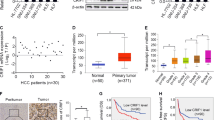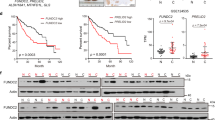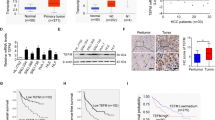Abstract
Mitochondrial dysfunctions play crucial roles in the carcinogenesis of various human cancers. However, the molecular mechanisms leading to mitochondrial dysfunction and thus cancer progression remains largely unclear. TFB1M (mitochondrial transcription factor B1) is a mitochondrial DNA-binding protein that activates the transcription of mitochondrial DNA. Our bioinformatics analysis indicated a significant up-regulation of TFB1M in hepatocellular carcinoma (HCC). Here, we investigated its clinical significance and biological functions in this malignancy. Here, we found that TFB1M was significantly upregulated in HCC cells probably due to decreased miR-130a-3p expression. High TFB1M expression was positively associated with poor patient survival in HCC. TFB1M contributes to HCC growth and metastasis by promoting cell cycle progression, epithelia-mesenchymal transition (EMT), and inhibiting cell apoptosis. Mechanistically, the metabolic switch from oxidative phosphorylation to glycolysis contributed to the promotion of tumor growth and metastasis by TFB1M overexpression in HCC cells. In summary, we demonstrate that TFB1M plays a crucial oncogenic role in HCC progression, indicating TFB1M as a promising prognostic marker and therapeutic target in HCC.








Similar content being viewed by others
Data availability
He datasets used and/or analysed during the current study are available from the corresponding author on reasonable request. Statement regarding the use of third parties to generate data: No third parties were used to generate data in the present study.
Code availability
Not applicable.
Abbreviations
- TFB1M:
-
Mitochondrial transcription factor B1
- HCC:
-
Hepatocellular carcinoma
- EMT:
-
Epithelia-mesenchymal transition
- PET:
-
Positron emission tomography
- OXPHOS:
-
Oxidative phosphorylation
- TFAM:
-
Mitochondria transcription factor A
- TCGA:
-
The cancer genome atlas
- siRNAs:
-
Small interference RNAs
- cDNA:
-
Complementary DNA
- PVDF:
-
Polyvinylidene difluoride
- H&E:
-
Hematoxylin and eosin
- IHC:
-
Immunohistochemical
- miRNAs:
-
MicroRNAs
- AML:
-
Acute myeloid leukemia
References
Akram M (2013) Mini-review on glycolysis and cancer. J Cancer Educ 28:454–457. https://doi.org/10.1007/s13187-013-0486-9
Anwanwan D, Singh SK, Singh S, Saikam V, Singh R (2020) Challenges in liver cancer and possible treatment approaches. Biochim Biophysica Acta Rev Cancer 1873:188314. https://doi.org/10.1016/j.bbcan.2019.188314
Cassim S, Vucetic M, Zdralevic M, Pouyssegur J (2020) Warburg and beyond: the power of mitochondrial metabolism to collaborate or replace fermentative glycolysis in cancer. Cancers. https://doi.org/10.3390/cancers12051119
Chen X, Li S, Ke Y, Wu S, Huang T, Hu W, Fu H, Guo X (2018) KLF16 suppresses human glioma cell proliferation and tumourigenicity by targeting TFAM. Artif Cells Nanomed Biotechnol 46:608–615. https://doi.org/10.1080/21691401.2018.1431654
Chen X, Yue B, Zhang C, Qi M, Qiu J, Wang Y, Chen J (2017) MiR-130a-3p inhibits the viability, proliferation, invasion, and cell cycle, and promotes apoptosis of nasopharyngeal carcinoma cells by suppressing BACH2 expression. Biosci Rep. https://doi.org/10.1042/BSR20160576
Ganapathy-Kanniappan S, Geschwind JF (2013) Tumor glycolysis as a target for cancer therapy: progress and prospects. Mol Cancer 12:152. https://doi.org/10.1186/1476-4598-12-152
Gao W, Wu M, Wang N, Zhang Y, Hua J, Tang G, Wang Y (2018) Increased expression of mitochondrial transcription factor A and nuclear respiratory factor-1 predicts a poor clinical outcome of breast cancer. Oncol Lett 15:1449–1458. https://doi.org/10.3892/ol.2017.7487
Hillen HS, Temiakov D, Cramer P (2018) Structural basis of mitochondrial transcription. Nat Struct Mol Biol 25:754–765. https://doi.org/10.1038/s41594-018-0122-9
Iurlaro R, Leon-Annicchiarico CL, Munoz-Pinedo C (2014) Regulation of cancer metabolism by oncogenes and tumor suppressors. Methods Enzymol 542:59–80. https://doi.org/10.1016/B978-0-12-416618-9.00003-0
Jiang X, Wang J (2019) Down-regulation of TFAM increases the sensitivity of tumour cells to radiation via p53/TIGAR signalling pathway. J Cell Mol Med 23:4545–4558. https://doi.org/10.1111/jcmm.14350
Kamarajugadda S, Stemboroski L, Cai Q, Simpson NE, Nayak S, Tan M, Lu J (2012) Glucose oxidation modulates anoikis and tumor metastasis. Mol Cell Biol 32:1893–1907. https://doi.org/10.1128/MCB.06248-11
Kato Y, Maeda T, Suzuki A, Baba Y (2018) Cancer metabolism: new insights into classic characteristics. Jpn Dental Sci Rev 54:8–21. https://doi.org/10.1016/j.jdsr.2017.08.003
Katsuki T, Nakayama Y, Akiyama M, Sawatsubashi Y, Nagata J, Minagawa N, Torigoe T, Izumi H, Kohono K, Hirata K (2018) Prognostic significance of mitochondrial transcription factor a expression in patients with right- or left-sided colorectal cancer. Anticancer Res 38:569–575. https://doi.org/10.21873/anticanres.12261
Kong X, Zhang J, Li J, Shao J, Fang L (2018) MiR-130a-3p inhibits migration and invasion by regulating RAB5B in human breast cancer stem cell-like cells. Biochem Biophys Res Commun 501:486–493. https://doi.org/10.1016/j.bbrc.2018.05.018
Lebelo MT, Joubert AM, Visagie MH (2019) Warburg effect and its role in tumourigenesis. Arch Pharmacal Res 42:833–847. https://doi.org/10.1007/s12272-019-01185-2
Lee H, Park J, Tran Q, Kim D, Hong Y, Cho H, Kwon SH, Brazil D, Kim SH, Park J (2017) Mitochondrial transcription factor A (TFAM) is upregulated in glioma. Mol Med Rep 15:3781–3786. https://doi.org/10.3892/mmr.2017.6467
Li JH, Liu S, Zhou H, Qu LH, Yang JH (2014) starBase v2.0: decoding miRNA-ceRNA, miRNA-ncRNA and protein-RNA interaction networks from large-scale CLIP-Seq data. Nucleic Acids Res 42:D92-97. https://doi.org/10.1093/nar/gkt1248
Lin CS, Liu LT, Ou LH, Pan SC, Lin CI, Wei YH (2018) Role of mitochondrial function in the invasiveness of human colon cancer cells. Oncol Rep 39:316–330. https://doi.org/10.3892/or.2017.6087
Liu X, Shen S, Wu P, Li F, Liu X, Wang C, Gong Q, Wu J, Yao X, Zhang H, Shi Y (2019) Structural insights into dimethylation of 12S rRNA by TFB1M: indispensable role in translation of mitochondrial genes and mitochondrial function. Nucleic Acids Res 47:7648–7665. https://doi.org/10.1093/nar/gkz505
Lu J, Tan M, Cai Q (2015) The Warburg effect in tumor progression: mitochondrial oxidative metabolism as an anti-metastasis mechanism. Cancer Lett 356:156–164. https://doi.org/10.1016/j.canlet.2014.04.001
Pinker K, Riedl C, Weber WA (2017) Evaluating tumor response with FDG PET: updates on PERCIST, comparison with EORTC criteria and clues to future developments. Eur J Nucl Med Mol Imaging 44:55–66. https://doi.org/10.1007/s00259-017-3687-3
Porporato PE, Filigheddu N, Pedro JMB, Kroemer G, Galluzzi L (2018) Mitochondrial metabolism and cancer. Cell Res 28:265–280. https://doi.org/10.1038/cr.2017.155
Potter M, Newport E, Morten KJ (2016) The Warburg effect: 80 years on. Biochem Soc Trans 44:1499–1505. https://doi.org/10.1042/BST20160094
Qu R, Sun Y, Li Y, Hu C, Shi G, Tang Y, Guo D (2017) MicroRNA-130a-3p suppresses cell viability, proliferation and invasion in nasopharyngeal carcinoma by inhibiting CXCL12. Am J Transl Res 9:3586–3598
Schwartz L, Supuran CT, Alfarouk KO (2017) The Warburg effect and the hallmarks of cancer. Anticancer Agents Med Chem 17:164–170. https://doi.org/10.2174/1871520616666161031143301
Senyilmaz D, Teleman AA (2015) Chicken or the egg: Warburg effect and mitochondrial dysfunction. F1000prime Rep 7:41. https://doi.org/10.12703/P7-41
Shirdel EA, Xie W, Mak TW, Jurisica I (2011) NAViGaTing the micronome–using multiple microRNA prediction databases to identify signalling pathway-associated microRNAs. PLoS ONE 6:e17429. https://doi.org/10.1371/journal.pone.0017429
Siegel RL, Miller KD, Jemal A (2020) Cancer statistics, 2020. CA Cancer J Clin 70:7–30. https://doi.org/10.3322/caac.21590
Soga T (2013) Cancer metabolism: key players in metabolic reprogramming. Cancer Sci 104:275–281. https://doi.org/10.1111/cas.12085
Srinivasan S, Guha M, Avadhani NG (2016) Mitochondrial respiratory defects promote the Warburg effect and cancer progression. Mol Cell Oncol 3:e1085120. https://doi.org/10.1080/23723556.2015.1085120
Tang F, Zhang R, Wang J (2019) Cyclooxygenase-2-mediated up-regulation of mitochondrial transcription factor A mitigates the radio-sensitivity of cancer cells. Int J Mol Sci. https://doi.org/10.3390/ijms20051218
Vander Heiden MG, Cantley LC, Thompson CB (2009) Understanding the Warburg effect: the metabolic requirements of cell proliferation. Science 324:1029–1033. https://doi.org/10.1126/science.1160809
Wang S, Han H, Hu Y, Yang W, Lv Y, Wang L, Zhang L, Ji J (2018) MicroRNA-130a-3p suppresses cell migration and invasion by inhibition of TBL1XR1-mediated EMT in human gastric carcinoma. Mol Carcinog 57:383–392. https://doi.org/10.1002/mc.22762
Wang Z, Li Z, Fu Y, Han L, Tian Y (2019) MiRNA-130a-3p inhibits cell proliferation, migration, and TMZ resistance in glioblastoma by targeting Sp1. Am J Transl Res 11:7272–7285
Wen YA, Xiong X, Scott T, Li AT, Wang C, Weiss HL, Tan L, Bradford E, Fan TWM, Chandel NS et al (2019) The mitochondrial retrograde signaling regulates Wnt signaling to promote tumorigenesis in colon cancer. Cell Death Differ 26:1955–1969. https://doi.org/10.1038/s41418-018-0265-6
Wu K, Zhao Z, Xiao Y, Peng J, Chen J, He Y (2016) Roles of mitochondrial transcription factor A and microRNA5903p in the development of colon cancer. Mol Med Rep 14:5475–5480. https://doi.org/10.3892/mmr.2016.5955
Wu S, Fahmy N, Alachkar H (2019) The mitochondrial transcription machinery genes are upregulated in acute myeloid leukemia and associated with poor clinical outcome. Metabolism Open 2:100009. https://doi.org/10.1016/j.metop.2019.100009
Xie D, Wu X, Lan L, Shangguan F, Lin X, Chen F, Xu S, Zhang Y, Chen Z, Huang K et al (2016) Downregulation of TFAM inhibits the tumorigenesis of non-small cell lung cancer by activating ROS-mediated JNK/p38MAPK signaling and reducing cellular bioenergetics. Oncotarget 7:11609–11624. https://doi.org/10.18632/oncotarget.7018
Yang J, Ren B, Yang G, Wang H, Chen G, You L, Zhang T, Zhao Y (2020) The enhancement of glycolysis regulates pancreatic cancer metastasis. Cell Mol Life Sci CMLS 77:305–321. https://doi.org/10.1007/s00018-019-03278-z
Yao J, Xu F, Zhang D, Yi W, Chen X, Chen G, Zhou E (2018) TP73-AS1 promotes breast cancer cell proliferation through miR-200a-mediated TFAM inhibition. J Cell Biochem 119:680–690. https://doi.org/10.1002/jcb.26231
Zhang R, Wang J (2018) HuR stabilizes TFAM mRNA in an ATM/p38-dependent manner in ionizing irradiated cancer cells. Cancer Sci 109:2446–2457. https://doi.org/10.1111/cas.13657
Acknowledgements
Not applicable.
Funding
This study was supported by the National Natural Science Foundation of China (Grant 81802345), China Postdoctoral Science Foundation funded project (Grant 2019M663984) and National Science Basic Research Plan in Shaanxi Province of China (Grants 2020JM-318 and 2020JM-327). Young Scientists Fund, 81802345, Peng Yuan.
Author information
Authors and Affiliations
Contributions
JM, ZW and FL performed most of the experiments and analyzed data; RT, BZ and PQ participated in the in vitro and vivo study. HZ and JY designed the overall study, supervised the experiments. JM and YT wrote the paper. YT and PY revised the paper. PY and HZ acquired the funding. All authors read and approved the final manuscript.
Corresponding authors
Ethics declarations
Competing interests
The authors declare that they have no competing interests.
Ethics statement
This study was approved by the institutional ethics committee of the Air Force Military Medical University.
Consent for publication
Written informed consents have been obtained from all subjects.
Additional information
Publisher's Note
Springer Nature remains neutral with regard to jurisdictional claims in published maps and institutional affiliations.
Supplementary Information
Below is the link to the electronic supplementary material.
Rights and permissions
About this article
Cite this article
Mu, J., Tian, Y., Liu, F. et al. Mitochondrial transcription factor B1 promotes the progression of hepatocellular carcinoma via enhancing aerobic glycolysis. J. Cell Commun. Signal. 16, 223–238 (2022). https://doi.org/10.1007/s12079-021-00658-8
Received:
Accepted:
Published:
Issue Date:
DOI: https://doi.org/10.1007/s12079-021-00658-8




